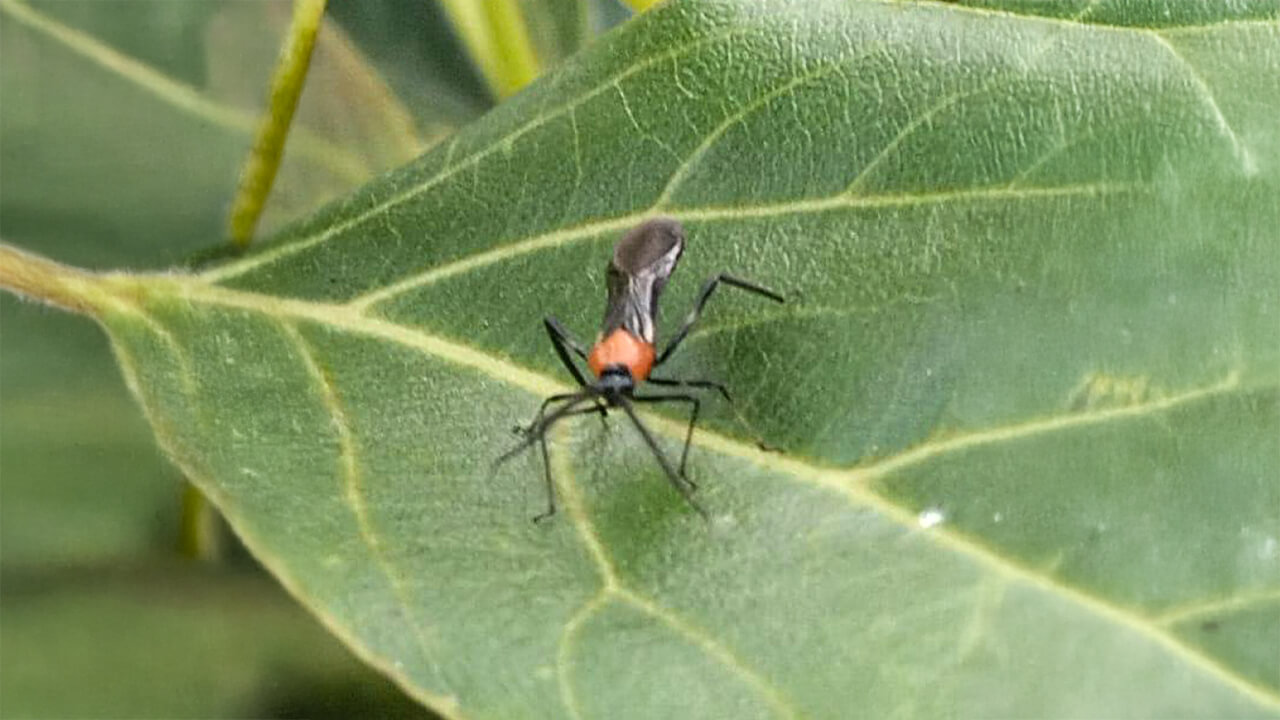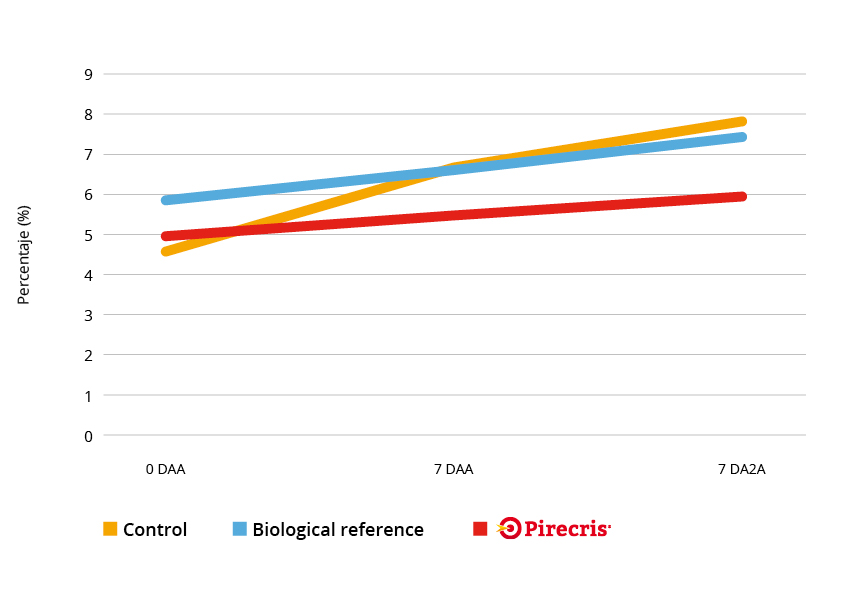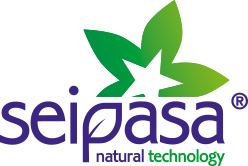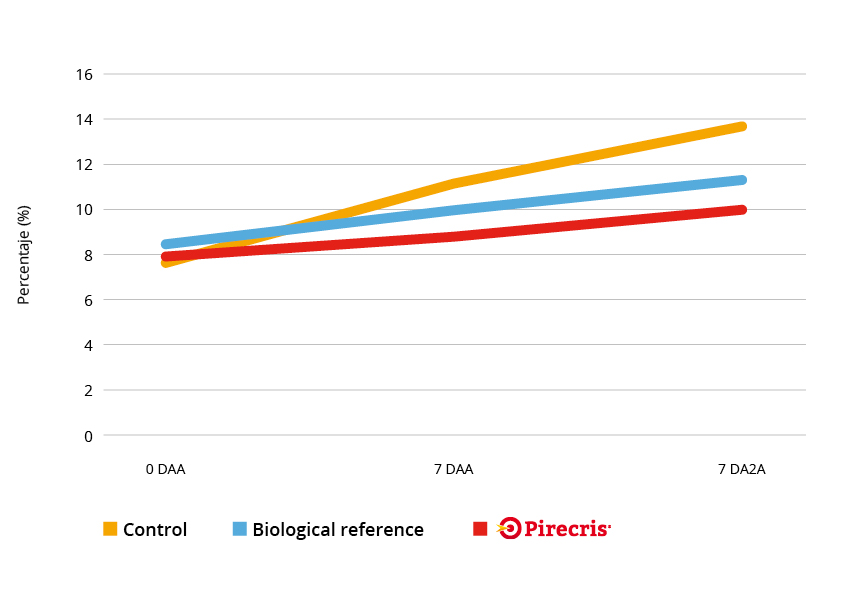Monalonion: damage to avocados and biological control strategies

Monalonion velezangeli on avocado leaf.
Colombia is one of the world’s leading producers and exporters of avocados. In fact, according to the US Avocado Board, Colombia tripled its exports of Hass avocados to the United States in the first half of 2024. The importance of the avocado in Colombia’s agri-food exports makes this crop more than sensitive to all the threats it faces in the form of pests and diseases.
One of the most damaging is monalonion velezangeli. Also known as the avocado bug, it is a small insect found near the shoots or under the leaves.
The monalonion is particularly aggressive at the fruit set stage of the avocado. The insect burrows its stylet into the fruit and sucks out the sap, producing an exudate which becomes one of the most visible elements of the attack.The most obvious symptoms are brown to reddish oily spots, which eventually darken and devalue the fruit, causing it to be rejected for export markets.
In addition to fruit, monalonion also attacks leaves, stems and inflorescences. This insect has a life cycle of 50 to 60 days to adult and is usually found in areas of low sunlight. The conditions that make it viable are characterised by high relative humidity, an average temperature below 20 degrees and low light levels.
Monalonion is also more likely to be found at high altitudes, between 1,600 and 2,000 metres above sea level.
Molecule rotation in control strategies
In Colombia, control strategies for monalonion in avocados have focused on the use of chemical synthesis treatments based on active ingredients such as malathion. It is a highly effective pest control agent but has two major drawbacks: the presence of residues on the fruit and the risk of resistance.
Biorationals are also available, but growers have seen poor results. For all these reasons, growers are increasingly looking for new options in the rotation of molecules used in integrated pest management.
In response to this scenario, Seipasa has recently announced that it has obtained the phytosanitary registration of Pirecris for the control of monalonion in avocado.
Bioinsecticides against monalonion
Pirecris is a bioinsecticide developed from natural active ingredients that provide a powerful shock effect to control insect populations quickly and safely. In addition to its power, Pirecris leaves no residue on the fruit.
The key to the efficacy of Pirecris in controlling monalonion in avocados is its unique patented formulation. Its design ensures a balance between the PI and PII molecules that make up the active ingredient, providing maximum insecticidal efficacy with a lower dose of active ingredient.
The micro-molecules that make up the formulation condense and form a stable and balanced network throughout the solution, providing perfect coverage on the leaf and insect. Pirecris provides a powerful insecticidal action that works by blocking the insect’s respiratory system until it dies.
The excellent performance of the product is reflected in the results of the efficacy trial carried out in the Colombian municipality of El Santuario, an avocado growing area at 2,150 metres above sea level.
Figure 1 shows the average percentage of fruit damage. Treatment with Pirecris contains and reduces the impact of pest attacks. The Seipasa bioinsecticide improves the performance of the biological reference with which it was compared. Two applications were made with a 7-day interval.

Figure 1. Average percentage of damage by monalonion velezangeli on avocado fruit over the time evaluated in El Santuario.
Figure 2 focuses on the percentage of total damage, where again Pirecris proves to be the best treatment to control the damage caused by monalonion velezangeli.
Figure 2: Average of the percentage of monalonion velezangeli damage in the avocado plant over the time evaluated in El Santuario.
Zero residuality
Another major advantage of Pirecris bioinsecticide for the control of monalonion in avocados is the absence of residues in the fruit. Growers can apply Pirecris immediately before harvest without the risk of chemical residues on the fruit, as the product has a 0-day withdrawal period.
Furthermore, due to its composition, Pirecris is a product that avoids the risk of resistance, as it is classified in group IRAC 3A (Insecticide Resistance Action Committee). This allows the farmer to have another rotation option together with the other molecules used in integrated pest management, i.e. as a new organic alternative for rotation that can be used in all harvesting periods.







